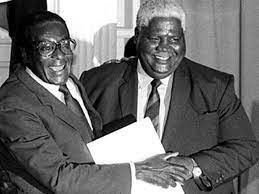
When the leaders of Zanu and Zapu — the late president Robert Mugabe and Joshua Nkomo — signed the Unity Accord on December 22nd 1987, they supposedly ended a conflict that had killed over 20 000 people since 1983 which is now largely referred to as Gukurahundi.
Ten years later, in 1997, December 22 was declared a national holiday, a day to reflect on the peace and reconciliation in Zimbabwe. The day is supposed to promote nationalism as Zimbabweans, to forget the exclusionary politics of the years before that promoted class, ethnic and religious differences.
The history of animosity and the distrust between the political leaders supposedly ended with the signing of the accord.
Fast-forward to 2023 and the intervening years since the turn of the new millennium, Zimbabweans are no closer to being united. Any notion of nationalism, peace and harmony disappeared with the emergence of the Movement of Democratic Change in 1999 led by trade unionist Morgan Tsvangirai.
Even a government of national unity from 2009 to 2013 failed to heal the mutual animosity between Zanu PF and the MDC.
By the 2018 elections, both Mugabe and Tsvangirai had disappeared from the political scene but the polarisation between the two parties and their supporters has worsened.
This is because some of the actors in the 1980s disturbances remain in power and their traits remain in the fore, such as the incapacity to tolerate political differences and the inability to share political space by the ruling elite.
Such traits have proved an albatross in Zimbabwe’s nation building efforts and the current political leadership, especially those in power, do not seem to have the capacity or wherewithal to shepherd the country towards a common purpose.
- Corruption Watch: Get scared, 2023 is coming
- Corruption Watch: Get scared, 2023 is coming
- Letters: Ensuring Africa’s food security through availability of quality seeds
- Is military's involvement in politics compatible with democracy?
Keep Reading
Zimbabwe is back to the situation of distrust and animosity between the two dominant political parties. Support for the leaders, President Emmerson Mnangagwa of Zanu PF and Citizens Coalition for Change leader Nelson Chamisa is split right down the middle is the August 2023 elections are anything to go by.
State sponsored violence against perceived critics of government has increased while human rights abuses have risen in frequency and scale since the 2018 elections.
Last week’s by-elections and those to follow in February next year as a result of the questionable recalls of recently elected CCC officials by one Sebenzo Tshabangu — masquerading as the interim secretary-general of the party — has deepened the political divide in the country and mistrust of those in power.
What has happened to the ideals of the Unity Accord that Mugabe and Nkomo forged all those years ago? Why is the ruling elite content to promote divisions among the population? Why is it threatened by new ideas or opposing views?
We must be comfortable in our disagreements without the need to beat up or maim those who hold opposing views. It starts with our politicians, especially those in leadership.
The 2018 and 2023 polls have left the country deeply polarized and there is little hope of political rapprochement between the two dominant figures, Mnangagwa and Chamisa.
As with the latter years of the reign of the late Robert Mugabe, Zimbabweans are left to deal with the result of political aggrandisement of a few.







